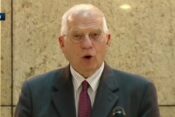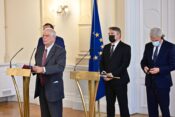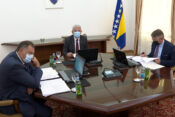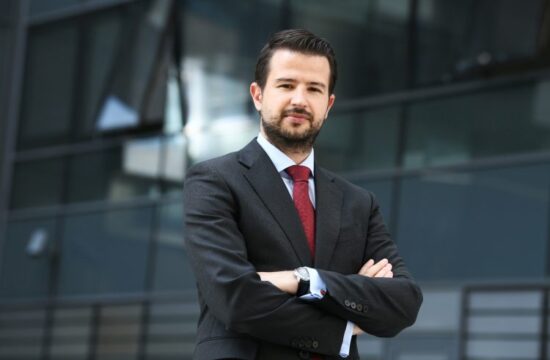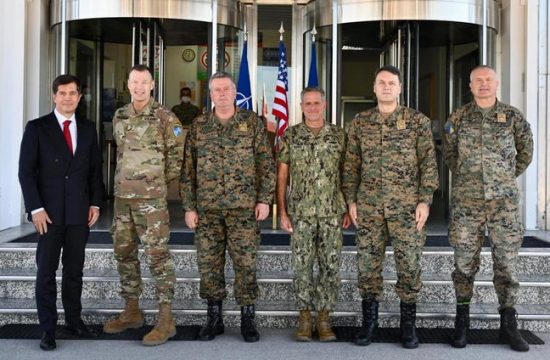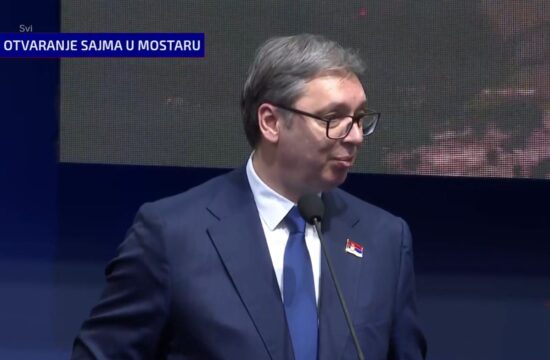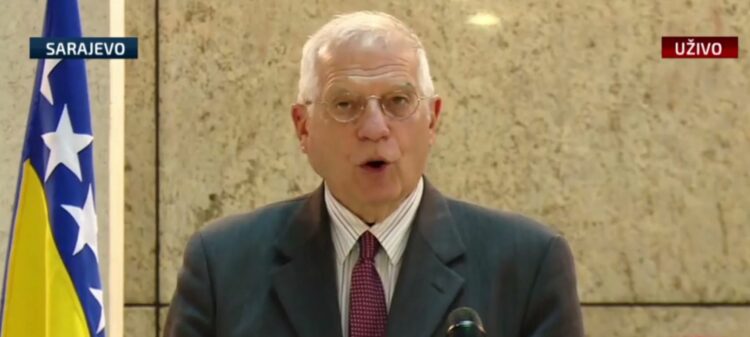
Bosnia and Herzegovina and the European Union were founded on same values and in this regard can be seen as "twins," EU High Representative, Josep Borrell, said on Saturday in Sarajevo, marking the 25th anniversary of the peace agreement that ended the country's 1992-95 war.
“Where a mosque’s call for prayer is in harmony with the ringing of church bells, while a synagogue stands beside them. Marks of three religions that for years were able to live in peace, like in my country in Spain, in the city of Toledo,” the EU High Representative for Foreign Affairs and Security Policy and Vice-President of the European Commission said in his speech.
He pointed out that this cultural plurality represents an enormous strength and wealth, but for those who want to keep divisions alive, “it can be twisted into a weapon.”
“History has taught us that divisions can be misused and become toxic,” Borrell said. “Twenty-five years ago, it turned neighbours into enemies. Families were torn apart and childhood friends were taking up arms against each other. It has happened many times in many places in the course of the history. This was not a single case but it was an awful one.”
He pointed to another similarity, saying that the EU and Bosnia were born the same year.
“In a way, the EU and Bosnia and Herzegovina are twins. We are founded on the same values of reconciliation and came into being around the same time. In 1992, the EU succeeded to become the then European Communities, and [in the same year] Bosnian citizens voted by referendum for independence.”
The vote was followed by a brutal war which ended on November 21, 1995. Borrell reminded that the European Union has been a project aimed at overcoming the tragedies of the past.
“One of these tragedies started here in this city. Another tragedy followed and the continent almost committed a suicide. We Europeans killed each other, destroyed each other, we had sewn death and hatred, but we have been able to overcome these tragedies, reconcile and build unity,” he said.
Borrell said that more than 80 percent of citizens support Bosnia's efforts to join the EU and that this should be something that will “unite Bosnian political parties and the general public alike in a common endeavor – pursuing a goal that is shared by such an impressive amount of people.”
He noted that progress has been made in many fields towards building a stable and democratic Bosnia and Herzegovina throughout the past 25 years but stressed that “the journey is not over and a lot remains to be done.”
“During all this time, the EU stood by Bosnia’s side,” he added.
“Here in Bosnia and Herzegovina, as elsewhere in the region, deep-rooted political divides, shortfalls in the justice system, corruption, and persistent negative rhetoric continue to block progress. We have to recognise that unfortunately, it is still like this,” Borrell said.
The EU official said that he spoke to Bosnian citizens who told him that they do not understand why their future is being held back by “political and administrative weaknesses with their roots in the past when they want to be projected into the future.”
“They have a wider view going beyond Bosnia and Herzegovina and beyond the region. Also thanks to the digital world and visa liberalisation they can move, watch, they know what is happening beyond their borders. Their expectations are high and they need to be met,” he stressed, warning that failure to deliver on reforms will not only slow the path to the EU, but that “people will continue to vote with their feet, and leave the country.”
The Dayton Agreement gave Bosnia a complex governance set-up that requires coordination and cooperation among and across the governance structure of Bosnia and Herzegovina, but with real political will, “you can make anything work,” he said.
However, he noted that “too often we see political infighting and impasse.”
“Let’s use this anniversary to be a turning point, to move from post-war to pre-accession. To accelerate the process and to move from Dayton to Brussels. This is the journey that this society wants to do,” Borrell said, advocating for reforms of the institutional and legal framework that would “transform the Dayton architecture into one that provides a foundation for a functioning society based on principles of democracy and the protection of human rights – this has to be inclusive, and this will require time and a broad national debate.”
The EU, which Borrell described as a “reconciliator of past enemies,” will remain at Bosnia's side in the these efforts, but the requirement for EU membership includes “a well-functioning democracy, strong rule of law and upholding of individual fundamental rights.”
“The road you have ahead is clear. The European Commission Opinion’s 14 key priorities endorsed by the Council in December last year provide a roadmap setting out the reforms needed towards EU accession,” Borrell said.
“Bosnia and Herzegovina has to find this way – the way of positive creation, way of doing, having ambitions, having prospect to become – as many of us before you – a place where political freedom, economic prosperity and social cohesion are landmarks of stabilisation. That is my message: everything is possible. And EU is there to help and I hope that we can do it together,” he said.

